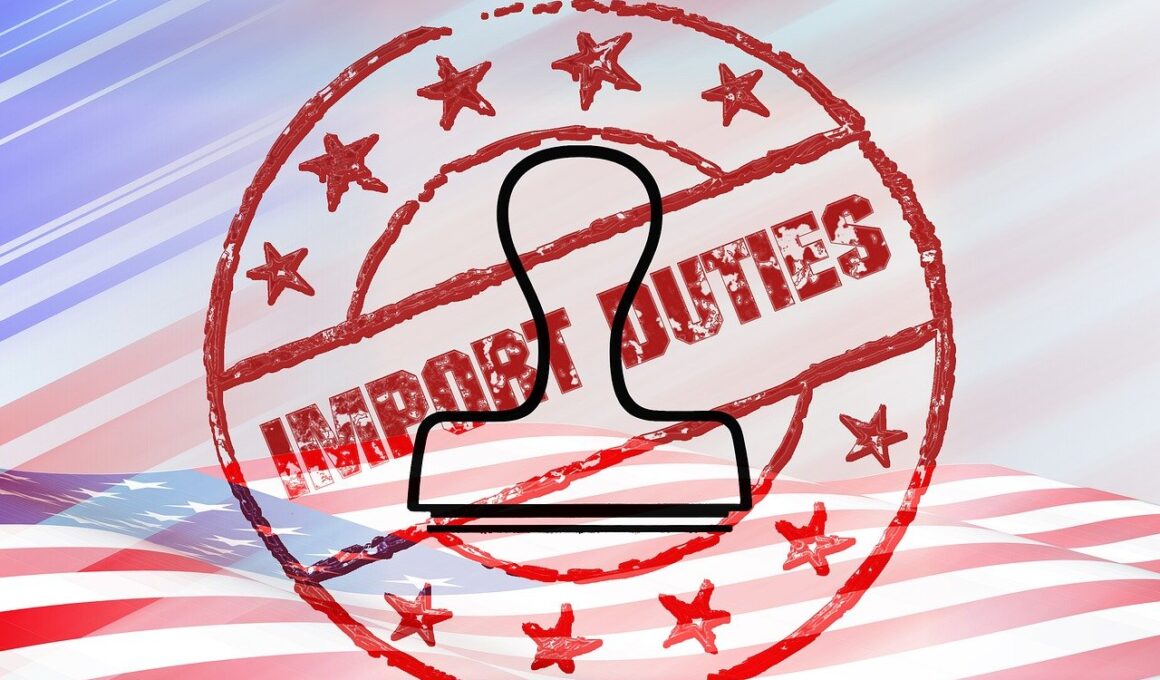The Role of Customs Duties in Government Revenue
Customs duties serve as a vital component in the realm of government revenue management. They are taxes imposed on imported and exported goods, ensuring that the state collects revenue while regulating trade. The significance of customs duties extends beyond revenue generation; they also act as a protective measure for local industries. This protection impacts domestic production, fostering growth in sectors that may otherwise struggle against cheaper foreign competition. Consequently, such duties encourage spending within the local economy, promoting job creation. Moreover, customs duties can significantly influence governmental policy, reflecting a nation’s priorities regarding trade balances and international relations. By adjusting these tariffs, governments can respond to economic fluctuations or protect strategic industries. Importantly, the effectiveness of customs duties can vary widely between countries based on their economic systems and enforcement capabilities. In addition to direct financial benefits, these duties may also contribute to better compliance with international trade laws. Ensuring proper customs duty collection helps minimize smuggling activities and promotes legal trade practices. Thus, customs duties are integral not only for financial health but also structural integrity within the global economic framework.
Revenue generated from customs duties often plays a crucial role in a country’s fiscal policies and budgeting processes. Governments rely on this income to fund various public services, ranging from education to healthcare. The funds collected through customs duties also help finance infrastructure projects like roads, bridges, and ports, essential for economic development. Therefore, the consistent collection of duties directly influences a government’s ability to maintain and improve public services. Additionally, customs duties can be structured to encourage sustainability by taxing goods that have a heavy environmental impact. This approach not only generates revenue but also promotes greener practices among producers and consumers. However, governments must also ensure that customs duties do not overly burden consumers. High tariffs can lead to increased costs for imported goods, affecting household budgets and overall economic stability. Hence, balancing these duties while generating adequate revenue remains a critical responsibility for policymakers. Furthermore, modern technology plays a significant role in enhancing customs revenue collection through better tracking and enforcement mechanisms. Improved infrastructure can streamline processes, reducing costs and delays often associated with customs clearance.
Impact on Trade and Economy
Customs duties can have a profound impact on both international trade and a nation’s economy. Through protective tariffs, governments can reserve market space for domestic products, enhancing local competitiveness. However, this interplay can lead to retaliation from other nations, prompting trade disputes that may escalate into broader economic challenges. Such reactions can alter trade dynamics, making regulations and duties critical in diplomacy and international relations. In a world increasingly driven by globalization, countries who impose high tariffs may find themselves isolated from crucial trade partnerships, limiting growth opportunities. Conversely, maintaining lower tariffs can enhance market access for local businesses, encouraging exports and stimulating economic expansion. Importantly, customs duties also play a significant role in shaping public perception regarding foreign goods. By making imports more expensive, duties can encourage consumers to choose domestic products, fostering national pride and economic resilience. Nevertheless, policymakers must remain vigilant, as mismanaged customs duties can lead to inefficiencies, administrative burdens, and even corruption. Therefore, crafting fair and transparent customs policies benefits not only government revenue but also national economic growth and stability.
Customs duties also serve as a tool for governments to address social issues within their borders. By imposing higher tariffs on goods considered non-essential, authorities can encourage consumption of essential domestic products, supporting local farmers and manufacturers. This practice not only promotes social equity but can also stimulate local employment. Moreover, governments can use targeted customs duties to combat industries viewed as harmful, such as those linked to significant carbon footprints. By imposing hefty tariffs on pollutants, these regulations can encourage greener alternative products and innovation. Furthermore, customs duties influence foreign investment decisions, as businesses assess the cost implications of imported materials and machinery. Sensible customs regulations can attract investors looking for stable operating conditions, potentially leading to job creation and economic growth. Conversely, overly stringent duties can deter potential investors, compounding national challenges. Additionally, customs duties must be adaptable to changing economic conditions, ensuring they remain relevant and effective. Regular reviews and adjustments help manage evolving trade patterns and new market realities, reinforcing a government’s capability to respond to economic changes.
Challenges and Opportunities
Despite their importance, customs duties are fraught with challenges that governments must navigate. One significant challenge is the international pressure to reduce trade barriers, as organizations like the World Trade Organization advocate for free trade. This pressure can complicate a nation’s ability to implement significant customs duties while remaining competitive in the international arena. Additionally, the rise of e-commerce complicates customs management, as governments struggle to enforce duties on smaller, more frequent shipments. As online shopping becomes a norm, defining and enforcing customs duties on such transactions is increasingly difficult. However, this technological advance also offers opportunities for revenue enhancement. By investing in sophisticated tracking and analytics systems, governments can improve customs enforcement and streamline processes, ensuring compliance and reducing smuggling. Moreover, increased transparency in the customs process can improve public trust, enhancing voluntary compliance among importers. Education initiatives that inform businesses about customs regulations can further help smooth the compliance process, ensuring that revenues are maximized without imposing undue burdens. Ultimately, addressing these challenges will require adaptive strategies and collaborative approaches to international trade relationships.
The role of customs duties in government revenue highlights their dual significance as both financial instruments and tools of economic policy. As governments strive for fiscal stability, understanding how customs duties interact within the broader context of international trade becomes paramount. This understanding enables better forecasting of potential revenue streams while managing trade relationships effectively. In a globalized economy, countries must balance protective measures with competitive practices, ensuring they remain viable players on the world stage. Moreover, innovative customs policies can foster economic resilience by addressing social challenges and environmental concerns. Using customs duties strategically can thus stimulate growth without the downsides of excessive protectionism or isolationism. The future of customs duties will inevitably involve both challenges and opportunities, as governments adapt to changing global dynamics. Emerging trends such as digital trade and increased consumer awareness further complicate this landscape. To navigate this complexity, governments must invest in robust customs capabilities. Ultimately, customs duties must evolve alongside the global economy, ensuring they continue to serve vital functions in government revenue while promoting fair trade practices.
Conclusion
The examination of customs duties reveals their multifaceted role in government revenue management. By functioning as both a source of income and a means to shape economic policies, customs duties are fundamental to maintaining a balanced national economy. As trade patterns continue to evolve, countries must remain agile and responsive to changes within both domestic and international landscapes. Adapting customs duties to reflect the realities of global commerce will be essential for sustaining government function and ensuring fair trade practices. Policymakers should focus on transparency and efficiency in revenue collection, employing technology to enhance customs operations for better regulatory success. Engagements with stakeholders—including businesses, consumers, and international partners—will be crucial for building trust and improving compliance. As nations face unprecedented challenges related to globalization, climate change, and economic disparities, customs duties will play an increasingly prominent role in addressing these issues. Looking ahead, setting clear objectives and evaluating the impact of customs duties will help governments maximize their benefits. In doing so, they can fortify their economies while fostering sustainable and responsible trade practices.
This multidimensional perspective on customs duties demonstrates their crucial role in government finance. They not only contribute significantly to revenue but also influence broader economic and social dynamics. Understanding these aspects helps policymakers design better fiscal strategies and trade agreements, ensuring a thriving economy that benefits all citizens. Emphasizing transparency, efficiency, and fair practices will enhance both compliance and public trust. Ultimately, effective customs duties will benefit not only the government but also promote a more equitable and prosperous society.


